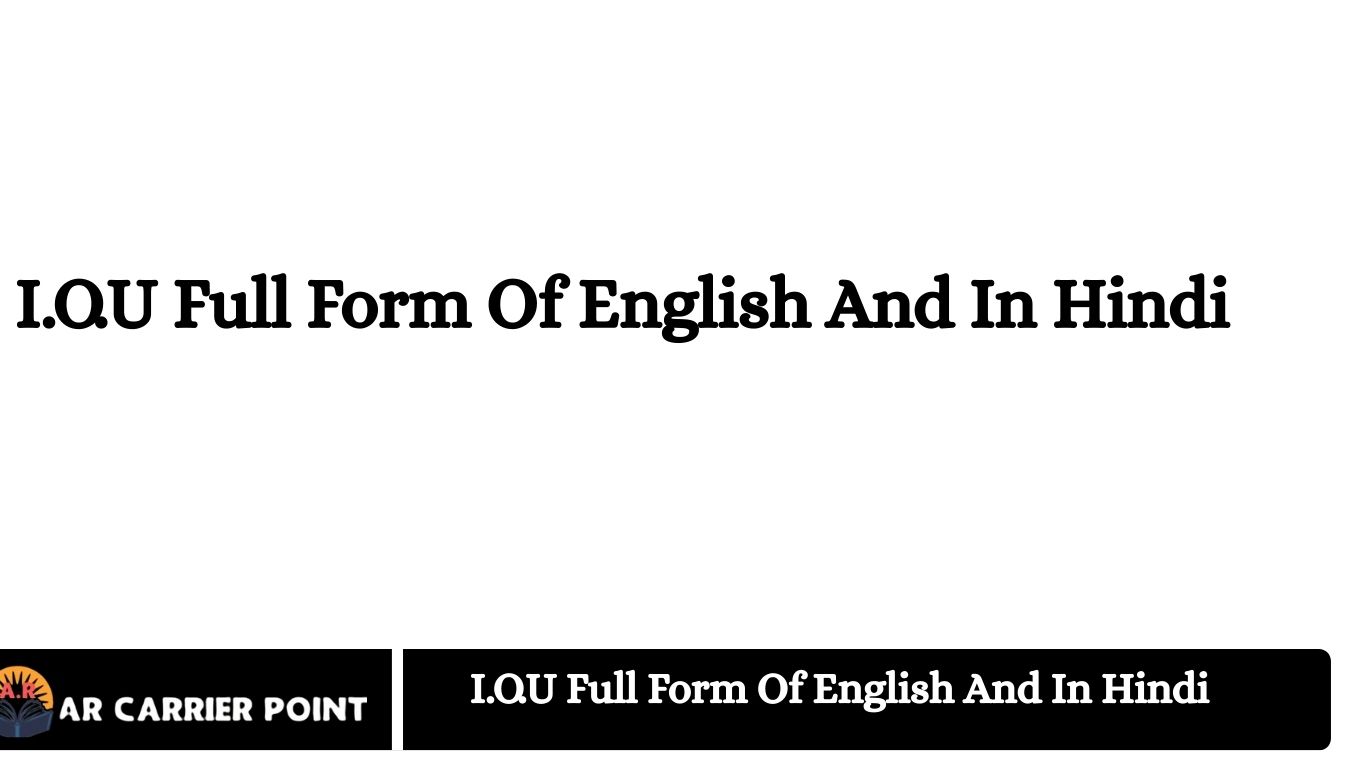I.O.U Full Form Of English
The full form of I.O.U is “I Owe You.” It is an informal written acknowledgment of debt. An I.O.U is typically used between two individuals or parties to confirm that one party owes money or something of value to the other. Unlike a formal promissory note, an I.O.U is generally not a legally binding document unless it contains specific terms and is signed by both parties. The abbreviation “I.O.U” originated from the phrase “I owe you,” and its earliest use can be traced back to the 18th century. It is often used in casual financial agreements where trust exists between the parties, such as loans among friends, family, or colleagues. For example, if someone lends $50 to a friend, the friend might write an I.O.U note stating the amount and the date, acknowledging the debt and their intent to repay it.
While I.O.U notes are less formal than contracts, they still hold importance in maintaining clarity and understanding in personal financial matters. In business, especially in accounting and informal transactions, I.O.U documents may be temporarily used until more formal paperwork is completed. In modern times, I.O.U can also represent digital or token-based obligations, such as in cryptocurrency or blockchain systems, where a platform might issue I.O.U tokens representing future payments or services. Regardless of the format, the fundamental idea behind an I.O.U remains the same—it reflects a commitment to repay a debt.
I.O.U Full Form Of Hindi
I.O.U का फुल फॉर्म है “I Owe You”, जिसका हिंदी में अर्थ होता है “मैं आपको देना चाहता हूँ” या “मैं आपका ऋणी हूँ।” यह एक अनौपचारिक दस्तावेज़ होता है, जो यह दर्शाता है कि किसी व्यक्ति ने किसी अन्य व्यक्ति से कुछ उधार लिया है—चाहे वह पैसा हो, वस्तु हो, या कोई अन्य मूल्यवान चीज़—और वह उसे वापस लौटाने का वादा करता है। I.O.U आमतौर पर तब लिखा जाता है जब दो पक्षों के बीच भरोसे पर आधारित लेन-देन होता है, जैसे कि दोस्तों, रिश्तेदारों या सहकर्मियों के बीच। उदाहरण के तौर पर, यदि कोई व्यक्ति अपने मित्र से ₹1000 उधार लेता है, तो वह एक कागज़ पर “I.O.U ₹1000” लिखकर यह स्वीकार कर सकता है कि वह यह राशि भविष्य में लौटाएगा।
यह एक कानूनी दस्तावेज़ नहीं होता, लेकिन अगर इसमें ऋण की राशि, तारीख और हस्ताक्षर आदि स्पष्ट रूप से दिए जाएँ, तो इसे एक प्रमाण के रूप में इस्तेमाल किया जा सकता है। व्यवसायों में भी कभी-कभी इसे अस्थायी रिकॉर्ड के रूप में इस्तेमाल किया जाता है जब तक कि औपचारिक समझौते नहीं हो जाते। आधुनिक समय में, I.O.U का उपयोग डिजिटल रूपों में भी किया जाता है, जैसे कि क्रिप्टोकरेंसी और ब्लॉकचेन सिस्टम में, जहाँ डिजिटल टोकन के रूप में I.O.U जारी किए जाते हैं जो भविष्य में भुगतान या सेवा देने का वादा करते हैं। संक्षेप में, I.O.U एक सरल लेकिन उपयोगी माध्यम है, जो यह दिखाता है कि कोई व्यक्ति किसी अन्य का कर्ज़दार है और वह उसे चुकाने की जिम्मेदारी स्वीकार करता है।
Read More: RER Full Form In Biology Of English And In Hindi
Frequently Asked Questions
What does I.O.U stand for?
I.O.U stands for “I Owe You,” which is an informal written acknowledgment of a debt or obligation.
Is an I.O.U legally binding?
Generally, an I.O.U is not legally binding unless it contains specific terms such as the amount owed, repayment date, and signatures.
When is an I.O.U used?
I.O.U is commonly used in informal situations like borrowing money from friends, family, or colleagues.
What is the difference between an I.O.U and a promissory note?
An I.O.U is a simple acknowledgment of debt, while a promissory note includes a legal promise to repay, terms, and often interest.
Can I.O.U be used in business?
Yes, businesses may use I.O.U notes temporarily until a formal contract or payment is processed.
Can an I.O.U be verbal?
While verbal I.O.U agreements can exist, written ones are more reliable and can serve as a reference or evidence.
Are I.O.U notes still relevant in the digital age?
Yes, I.O.U concepts are used digitally in forms like cryptocurrency tokens, digital receipts, or peer-to-peer payment agreements.
Conclusion
In conclusion, an I.O.U. (I Owe You) is a simple, informal written acknowledgment of debt between two parties. Though not legally binding like formal loan agreements, it serves as a reminder or record that one person owes money or goods to another. Commonly used in personal transactions, I.O.U.s are useful for maintaining trust and clarity in financial dealings without complex documentation.


